 Abraham Lincoln
If given the truth, the people can be depended upon to meet any national crisis...
Abraham Lincoln
If given the truth, the people can be depended upon to meet any national crisis...
 Guildford news...
for Guildford people, brought to you by Guildford reporters - Guildford's own news service
Guildford news...
for Guildford people, brought to you by Guildford reporters - Guildford's own news service
Working On The Railway By Bob Hind And His Award-winning Staff Magazine
Published on: 30 Oct, 2014
Updated on: 30 Oct, 2014
This is the second instalment of Bob Hind’s memories – this time his career on the railways based first at Woking and then London Waterloo, plus the staff magazine he edited called The Woking Grapevine. The first part, that includes his time as a butcher in Guildford, can be read here.
After the accident I had working as a butcher in West Byfleet and my time spent in hospital, I decided on a change of career. It was 1980, and I was told that guards were needed on the railway at Woking by a friend of mine. I phoned up and was invited in for an interview on a Tuesday. I was accepted and started at the training school down at Eastleigh the following Monday.
That was a six-week course followed by training with another guard for a month or so and learning the roads.
I certainly fell on my feet in that job, I loved it. Based at Woking, guards there worked into 10 different counties counting London as a county.
These were Surrey, Hants, Dorset, Wiltshire, Berkshire, West Sussex, Kent, Oxfordshire and Middlesex, so guards had to know their job and had vast route knowledge.
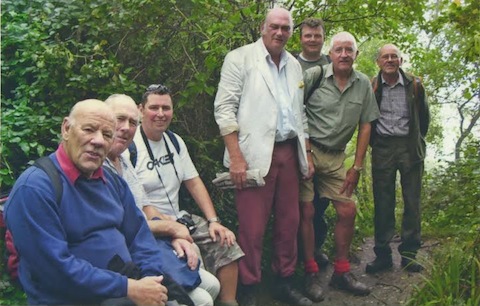
Bob Hind and some of his railway colleagues out walking. From left: Ray Cox, Alan Hughes, Kevin Butcher, Bob Hind, Steve Cooper, Pat Kinsella and John McCauliffe.
Woking being a mixed traction depot we worked every type of train possible. Electric local and express, loco hauled cross country, freight, ballast and engineering trains. Specials like the Orient Express even came down to us from time to time. The royal train driver was at Woking up to privatisation as well.
After some time I became a panel-man foreman which was filling in for the full-time foreman on occasions. That was another job I thoroughly enjoyed.
In 1990 the personal manager, Rod Crawford, put out a letter asking if anyone would like to write a staff magazine.
Although I had no experience, I was always good at composition and essay writing at school so I applied and got the job.
It was unpaid but I could have certain amounts of time off. I had to research, interview, write and take the photographs. Then I had to lay it out to a design – all hand drawn as I was not computer literate.
I then took it to the printer who laid everything out as I had planned. It was printed and delivered and then I had to distribute it to all stations from Weybridge to Rowlands Castle and down to Basingstoke.
The magazine was called The Woking Grapevine and I took to it with some gusto. I managed to get some marvellous stories from some of the men who had been on the job for many, many years.
The most well known was Jimmy Lester who was the fireman on Sir Winston Churchill’s funeral train in 1965.
I then found Eric Gosney at Farnham who brought rock ‘n’ roll to these shores. Perhaps not literally, but he was the fireman on the loco that brought Bill Haley and the Comets from Southampton Docks to London Waterloo on February 5, 1957.
Another was a driver who was shot twice with the same bullet in the Korean War. He and his pals were attacked one evening and Denis Copus received a bullet that passed through his left shoulder exited and passed across his spine then re-entered and exited out of his right shoulder.
He had four bullet hole scars in a line across his back of which I took a photograph and published. That caused some reaction I can tell you.
Woking being a cosmopolitan depot, the platform staff were a joy to work with and I published many stories from the lads originally from all over Asia and India. I am still in contact with many of them.
The magazine was a quarterly publication and after two years I was told to enter it into a staff magazine competition against a dozen other magazines from Network Southeast.
Mr Crawford and the depot manager Mark Evans were over the moon when The Woking Grapevine won the competition hands down.
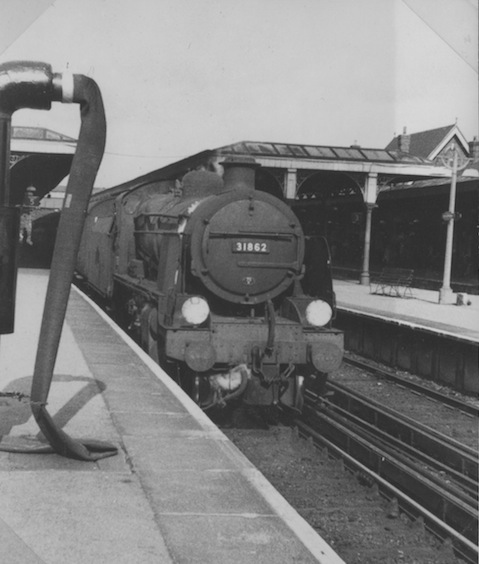
Bob received many vintage photos that he used in the magazine. This is a train pictured at Guildford from Reading en route to Redhill in 1964.
All the other mags were written by management and were quite frankly, boring to be honest. The Woking Grapevine motto was ‘For Staff, By Staff, About Staff’ and that is how I kept it.
Sometime in 1994 Network Southeast was combined with the rest of the southern section of British Railways and so the Grapevine closed.
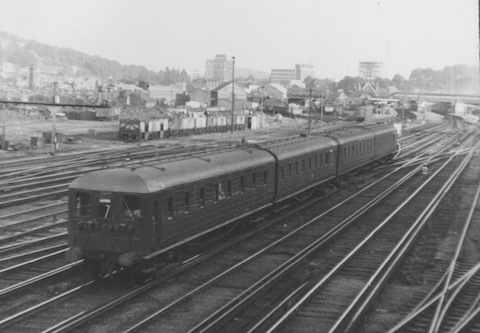
Another picture from Bob’s collection titled ‘up Pompey stopper’ also pictured at Guildford in 1964.
Peter Field was the area operations manager at the time and I went to see him about having a new magazine. I put my cards on the table and told him what I would like to do.
He agreed but said he would organise a competition to see who should write it. I was somewhat disappointed at this I can tell you. I entered the competition of course and one of the questions was: “How do we finance the railway today?”
I wrote across the page: “Not one member of railway staff is the slightest bit interested.” and then handed the paper in.
Of course I never got the job, and they gave it to an outsider who had no railway experience whatsoever. He even came down to Woking looking for me to assist him. Yeah right!
The new magazine lasted three issues.
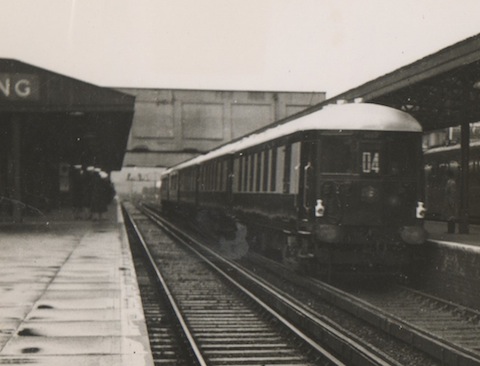
Rare picture of the royal train (Brighton Belle electric being used) as it passes through Woking on June 16, 1953. The train was taking Queen Elizabeth back to Windsor following the occasion of the Spithead Fleet Review at Portsmouth.
In 1997 I was promoted to train crew foreman at Waterloo, a very unenviable job I was to find out.
There were supposed to be eight foreman, but there were only six covering all the shifts with two on duty each turn, one on drivers and one on guards.
Filling retirement and dead man’s shoes I became senior foreman in 2001.
I was the foreman on duty when London was bombed 7/7 2005.
What a shift that was. I was on duty non stop for 14 hours as no one could get in to relieve me.
I had left home at 4.30am and arrived back at 11pm. I was then up again at 4am to return to work.
What made it worse was that I had a new boy working with me who was, of course, somewhat unexperienced. I was talking on three of the phones from 10am when the incident happened until I managed to get away at about 9.30pm.
I was giving instruction to crews from all over the South West Trains region and taking instruction from the ops manager.
Some of the ideas that some of the managers came up with to help out were ridiculous and I had to tell them – which didn’t go down well.
Waterloo was the only main line station open in London and the concourse was packed with people trying to get a train to somewhere near where they lived.
We ran non-stop trains to Reading in front of the stoppers so that Western Region passengers could pick up trains at Reading as Paddington was closed.
Some manager suggested running trains to the north of Euston so that passengers could pick up trains at Stevenage. When I told them that our crews did not know the route they looked at me as if to say “so what.”
The train crews were magnificent on that day and I put up a letter in the mess the following day thanking them all for their efforts in assisting me.
I never received a word of praise or thanks from those above me for what I had done to try and keep a service running. Not one word or a hand shake.
If I could do it to those below me why couldn’t someone above do it to me? I still feel very bitter about it to this day.
That day affected me somewhat; and one morning two weeks later I was walking to the station in the pouring rain and I can remember thinking how sick I was of commuting 13 days and nights a fortnight. I lived in Portsmouth where I had returned some years before.
I arrived at work and spoke to my boss asking if I could apply for early retirement. I managed to get it and retired from the railway the following December when I was 55, two weeks short of 25 years’ service.
The third and final instalment coming soon will feature Bob in his role as a drummer in a local band and details about local history books he has written and his regular history column he continues to write for the Portsmouth News.

Click on cartoon for Dragon story: Public Asked for Views on SCC’s Proposal for Reduced Speed Limits






Recent Articles
- Revealed Survey Shows SCC’s Preferred Two-unitary Option Has Least Public Support
- Highways Bulletin: Junction 10 Closures and Making Strides for Walk to School Week
- New River Boats for Surrey Care Trust
- Body Found in Woodland Believed To Be Missing 69-year-old
- Guildford Choral Promises a Summer Evening Spectacular
- Volunteers Are Needed To Test My Wearable Wellbeing Technology
- Mayor’s Diary: May 23 – June 8
- Work to Repair Cottage on Closed A281 Underway
- Letter: Not All PIP Claimants Need It
- AI Technology at the Forefront of Surrey Conservation Project


Search in Site
Media Gallery
Dragon Interview: Local Artist Leaves Her Mark At One of England’s Most Historic Buildings
January 21, 2023 / No Comment / Read MoreDragon Interview: Lib Dem Planning Chair: ‘Current Policy Doesn’t Work for Local People’
January 19, 2023 / No Comment / Read MoreA3 Tunnel in Guildford ‘Necessary’ for New Homes, Says Guildford’s MP
January 10, 2023 / No Comment / Read More‘Madness’ for London Road Scheme to Go Ahead Against ‘Huge Opposition’, Says SCC Leader
January 6, 2023 / No Comment / Read MoreCouncillor’s Son Starts Campaign for More Consultation on North Street Plan
December 30, 2022 / No Comment / Read MoreCounty Council Climbs Down Over London Road Works – Further ‘Engagement’ Period Announced
December 14, 2022 / No Comment / Read MoreDragon Interview: GBC Reaction to the Government’s Expected Decision to Relax Housing Targets
December 7, 2022 / No Comment / Read MoreHow Can Our Town Centre Businesses Recover? Watch the Shop Front Debate
May 18, 2020 / No Comment / Read More



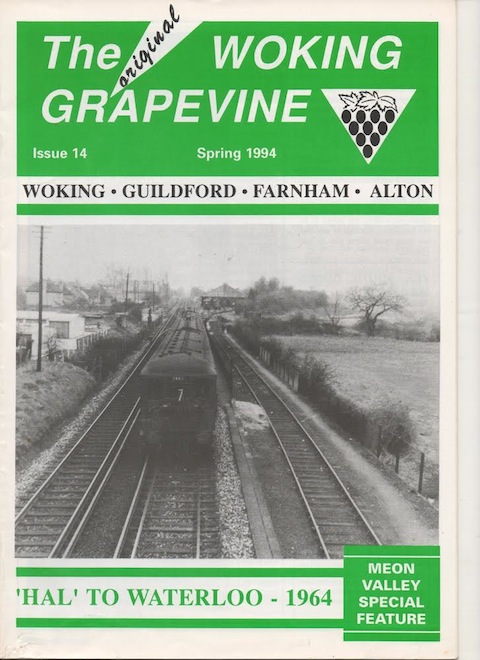



Recent Comments